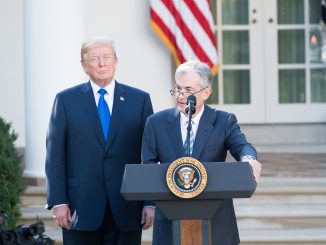A flurry of reports appears to indicate simultaneously that the government’s bailout of Wall Street is working to bring banks back to life, and that the Fed is making profits on the deal: See for instance here, here and here. According to these reports, the Fed received $19 billion in interest on its emergency loans to troubled institutions, which was about $14 billion more than it would have received if it had instead bought Treasuries. In addition, it was reported that the Fed made $4 billion of profits from the eight largest banks that have repaid TARP funds. This is seen as good news in Congress: “The taxpayers want their money back and they want the government out of our banking system,” said Representative Jeb Hensarling.
There are three fundamental problems with these stories. The first is that it raises a question about the function of the Fed: should a branch of government seek profits at the expense of the private sector? As we all know, the Fed is normally profitable and returns earnings above 6% on equity back to the Treasury. When the Fed profits on its holdings of government debt, that is essentially the government paying itself and thus of no consequence. Profiting at the expense of private institutions—even if they are the hated “banksters” of Wall Street—doesn’t seem to be something to celebrate. Especially when we are in a deep recession or depression, with a long way to go before the financial system recovers. All else equal, I’d rather see the private sector accumulate some profits so that it can recover.
Don’t get me wrong. I want retribution, too. We need a “bank holiday”, to begin next Friday: close suspect banks including all of the biggest that were subjected to the wimpy “stress test”. Spend the weekend going through the books and then on Monday begin to resolve the insolvent, to prosecute the banksters for fraud, and to retrieve from them their outsized bonuses financed by the public purse. It is payback time. My only objection is to the notion that we should be celebrating because the Fed appears to have made a profit on (a small part of) the bailout.
Second, there is every reason to suspect that the banks that have repaid TARP money and those making payments on loans from the Fed are still massively insolvent at any true valuation of the toxic waste still on their balance sheets. Recent reported profit in the financial sector is window-dressing, designed to fuel the irrationally exuberant stock market bubble. This will allow traders and other employees to cash in their stock options to recover some of the losses they incurred last year, even as bonuses are boosted for this year. Indeed, the main reason for returning the borrowed funds is to escape controls on executive salaries and bonuses. And, finally, it provides some important PR to counteract the growing anger over the financial bailouts. Only the foolish or those with some dog in the hunt will believe that the banksters have really managed to restore health to the financial sector as they continue to do what they did to cause the crisis.
Last but not least, the Fed’s “profits” are based on an infinitesimally small fraction of its ramped-up operations—its liquidity facilities (that also include discount window loans and currency swaps with other central banks, purchases of commercial paper and financing for investors in asset-backed securities). It has also spent $1.75 trillion buying bad assets, with any losses on those excluded from the profits numbers. The government’s profits also exclude current and expected spending on the rest of its reported $23.7 trillion dollar commitment to the financial bailout and fiscal stimulus package. The failure of just one medium-sized bank could easily wipe out the entire $14 billion of profits that has attracted so much notice. (See also Dean Baker on the government’s “profits”)
It is ironic that Euroland’s regulators are calling for much more radical steps than Washington is willing to take. German Chancellor Angela Merkel and French President Nicolas Sarkozy are calling for more regulation and for limits on executive compensation even as the Obama administration continues to argue that such limits would constrain the financial sector’s ability to retain the “best and the brightest”. If the bozos that created this crisis are the best that Wall Street can find, it would be better to shut down the US financial system than to keep them in charge. It is doubly ironic that Nigeria (a country that normally would not come immediately to mind as a role model) has actually charged the leadership of five of its major banks with crimes. Each of these banks had received government money in a bailout, and the CEOs stand accused of “fraud, giving loans to fake companies, lending to businesses they had a personal interest in and conspiring with stockbrokers to drive up share prices.”
Isn’t that normal business practice for Wall Street banks favored by Ben Bernanke and Timothy Geithner? It is time to get the NY Fed out of Goldman Sachs (NYSE:GS) back pocket, and to permanently downsize the role played by Wall Street and the Fed in our economic system.
- Bulenox: Get 45% to 91% OFF ... Use Discount Code: UNO
- Risk Our Money Not Yours | Get 50% to 90% OFF ... Use Discount Code: MMBVBKSM
Disclaimer: This page contains affiliate links. If you choose to make a purchase after clicking a link, we may receive a commission at no additional cost to you. Thank you for your support!




Hum, the last time I checked the Fed was a “private” banking cartel…not a branch of government. However, I wil admit that the government is a partner in the cartel.
The Fed should be abolished. Why should the FED profit on our dime?